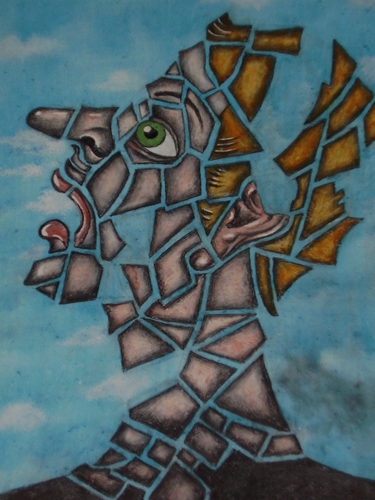 |
[…] One can consider the way in which
self-inflicted abused turns a passive trauma into an active one for the sexual
abuse survivor who is attempting to gain mastery over early trauma and its
aftermaths. Through self-destructive behaviours, the survivor regulates the
timing, pace and severity of her victimizations, paradoxically experiencing a
sense of empowerment. Ostensibly no longer at the mercy of an external
perpetrator, the patient assumes control of her abuse. […] (p.130)
Most
survivors who engage in violent enactment are aware of wanting to punish
themselves. These patients, at their core, are convinced that they are unfit
human beings. Filled with shame, they experience themselves as profoundly
defective and horribly toxic[…] Frequently told by their abuser that they
provoked and wanted the sexual attacks, survivors see themselves as
malevolently powerful. As adults, when some internal or external event evokes a
sense of having been “bad”, survivors may physically attack themselves or take
life threatening risks to punish themselves.
Although
being victimized is painful for the survivor of childhood sexual abuse, it is
also familiar. Often being a victim is the most secure identity the survivor
has. To initiate self-protective behaviour as an adult means to loosen the
survivor’s attachment to her internalized objects and to her most familiar
organisation of self. In addition, at an often deeply unconscious level,
continued victimization in adulthood validates for the survivor the reality of
the violations of the past; […] (p.131)
Always
juxtaposed alongside the survivor’s identification as a victim, running
parallel to it-though less consciously available-is her equally strong
identification with the perpetrator of her abuse. The ruthlessness and icy sadism
survivors can display toward their own bodies and minds and emotions are
shocking to witness. In part, this often represents an identification with the
abuser’s blatant lack of regard for his or her child victim. The enacting
survivor takes up where the perpetrator left off, turning fury and frustration
against herself in appallingly vicious ways.
The
patient’s identification with her abuser preserves relational bonds to the
internalized and often external victimizer, as well as to other nonabusing but unavailable
early figures. […]Even if the survivor is no longer in contact with her
victimizer, a strong attachment to the internalized object is tenaciously
protected and preserved. […] In addition to preservation of relational bonds,
the survivors' identification with the perpetrator protects her from contacting
the helplessness and vulnerability of her victimized self.[…] Identifying with
her perpetrator, the survivor experiences this illusory empowerment, denying
that her self-abuse is hurtful.[…] Like their victimizers, they successfully
spit of a sense of themselves as vulnerable, scared and out of control.
To help a
survivor recognize that she has incorporated and identified with aspects of her
abuser is difficult work.[…] The more the idea that she is in any way like her
perpetrator is anathema to her. Interpretation of this element of enactments
must be handled sensitively, lest the survivor’s already potent sense of
toxicity and malevolence be intensified unbearably. (p. 132)
If survivors are loath to acknowledge that
their enactments betray an identification with their abusers, they are equally
reluctant to recognize that their behaviors convey thoughts, feelings or
fantasies about current figures in their lives including the therapist.[..]
Terrified of the imagined power of envious, rageful, hateful feelings,
survivors may deny the interpersonal implications of these affect states,
instead turning them against themselves. As children they introjected their
abuser’s badness and projected their own goodness onto others to preserve the
hope o eventually receiving love and care. Now adult survivors continue this
process, they deny the relational failings of others, assuming the mantle of
responsibility for making relationships work. When someone the survivor loves
or needs disappoints or angers her, these feelings are often turned back on the
self. At the core of this process may be a dreadful fear of abandonment […]
Most difficult for survivors to acknowledge is
that, once they are in treatment, their violent enactments almost always
contain a transferential component, the acting-out element of enactment. Like
their parents once were, the therapist becomes a needed figure depended on by
survivors to see them through the terrifying and painful working –through of
their abuse and its consequences. As survivors loosen their grip on real and
internalized objects and are confronted with those losses, the therapist
assumes an even greater importance in their lives.
As they once protected their parents from their mistrust, terror and rage, they also deny negative reactions to the therapist and instead, act them out, often self-destructively. Sometimes, the enactment represents a vicious attack on the therapist’s ability to contain and to heal, a ruthless attempt to disrupt the interpretative and integrative work of treatment. At other times, the enactment speaks for the survivor’s bitter hurt, voiceless rage and desperate envy (p. 133)
As they once protected their parents from their mistrust, terror and rage, they also deny negative reactions to the therapist and instead, act them out, often self-destructively. Sometimes, the enactment represents a vicious attack on the therapist’s ability to contain and to heal, a ruthless attempt to disrupt the interpretative and integrative work of treatment. At other times, the enactment speaks for the survivor’s bitter hurt, voiceless rage and desperate envy (p. 133)
Davies, J. & Frawley, M (1994) Treating
the Adult Survivor of Sexual Abuse: A Psychoanalytic Perspective, United
States of America: Basic Books


